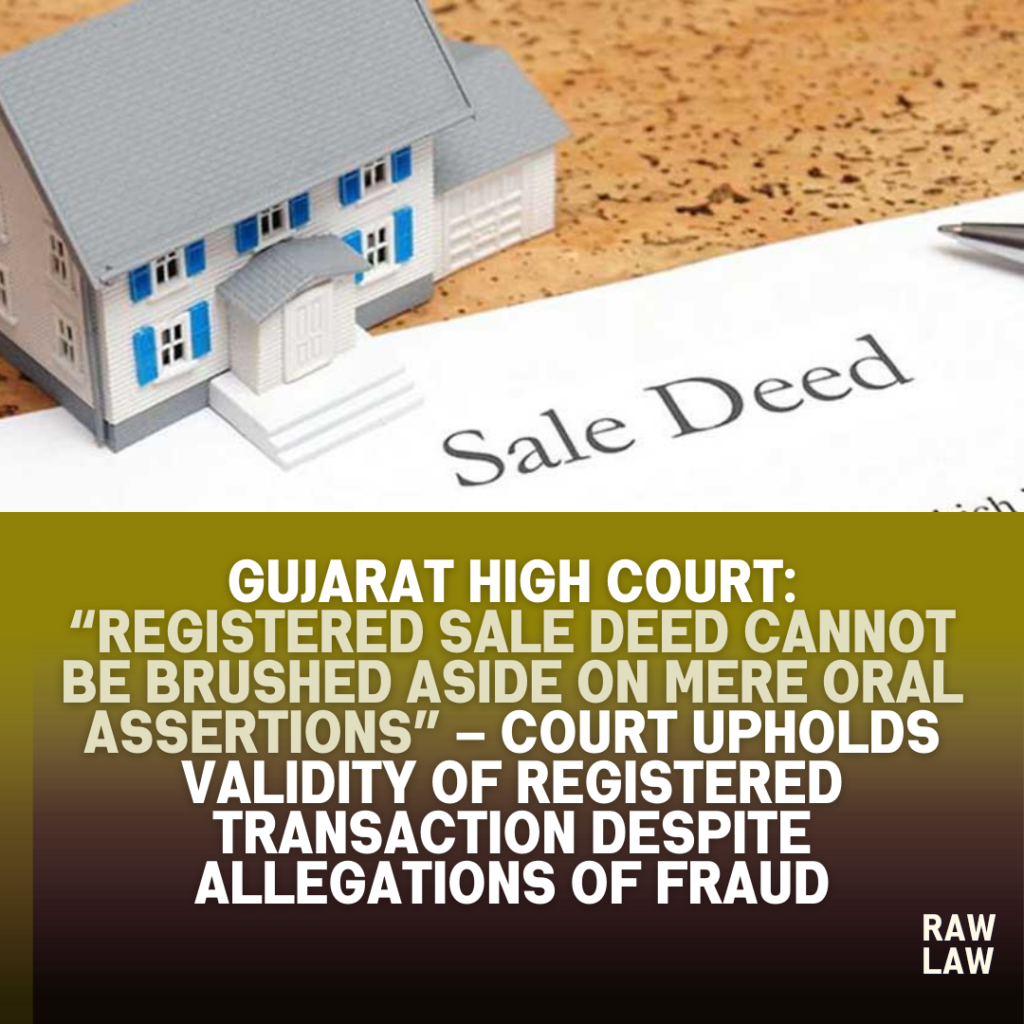Court’s Decision
The Gujarat High Court held that a registered sale deed carries strong evidentiary value and cannot be set aside merely on the basis of oral assertions alleging fraud or misrepresentation. The Court emphasized that the burden of proving fraud lies squarely on the party alleging it, and unless supported by cogent documentary evidence, such claims cannot prevail. The appeal challenging the sale transaction was therefore dismissed, and the registered sale deed was upheld as valid and binding.
Facts
The dispute arose out of a registered sale deed executed in favor of the respondent. The petitioner alleged that the sale was fraudulent, contending that he had never intended to transfer ownership of the property, and that the deed had been obtained by misrepresentation and without lawful consideration. The respondent, on the other hand, relied on the registered deed and the supporting revenue entries to assert ownership.
At the trial stage, the petitioner’s claims of fraud were not substantiated by any credible evidence. The trial court accordingly upheld the registered sale deed. Dissatisfied, the petitioner carried the matter in appeal before the High Court, insisting that the deed was a sham and deserved to be annulled.
Issues
- Whether a registered sale deed can be invalidated on the basis of unsubstantiated oral allegations of fraud and misrepresentation.
- Whether the petitioner discharged the burden of proof required to establish that the sale transaction was fraudulent.
Petitioner’s Arguments
The petitioner argued that the sale deed was executed without his knowledge and was the product of fraud. He claimed there was no genuine transfer of title or possession and that no consideration had in fact passed between the parties. He further submitted that the mere fact of registration does not validate a fraudulent document. He urged the Court to annul the sale deed, contending that the fraud vitiated the entire transaction.
Respondent’s Arguments
The respondent countered that the sale deed was duly executed, registered, and acted upon. Revenue records reflected his name as the lawful owner, and possession was also transferred. The respondent submitted that fraud cannot be presumed and must be strictly proved. Since the petitioner had produced no documentary evidence to substantiate his allegations, the respondent argued that the claim deserved outright dismissal. He also emphasized that the presumption attached to a registered document could not be displaced by bare allegations.
Analysis of the Law
The Court reaffirmed the legal principle that a registered document carries a presumption of validity. While this presumption is rebuttable, the onus lies on the party challenging the document to demonstrate fraud through convincing evidence. The Court reiterated that fraud must be pleaded with specificity and proved with precision. General allegations without corroborative evidence cannot undo a legally registered document.
Precedent Analysis
The Court relied upon several authoritative precedents:
- Prem Singh v. Birbal (2006) 5 SCC 353 – The Supreme Court held that fraud vitiates all solemn acts, but the party alleging fraud bears the heavy burden of proof. The Gujarat High Court referred to this principle in holding that unsubstantiated allegations cannot annul a sale deed.
- Bishundeo Narain v. Seogeni Rai (AIR 1951 SC 280) – This case stressed that fraud must be specifically pleaded and proved, not vaguely alleged. The Court cited this decision to highlight the deficiency in the petitioner’s pleadings.
- Ramesh Kumar v. Furu Ram (2011) 8 SCC 613 – The Supreme Court underscored that a registered sale deed carries strong evidentiary value, which cannot be overturned without compelling proof. The Court applied this principle to uphold the deed in question.
Court’s Reasoning
The Court observed that the petitioner had made sweeping allegations of fraud but had failed to produce any material evidence in support. No witnesses or documentary proof were brought to establish that the consideration had not passed or that consent had been unlawfully procured. In contrast, the respondent produced the registered sale deed and revenue records reflecting his ownership.
The Court reasoned that registration of a document is a solemn act performed by a public authority, and such documents enjoy a presumption of regularity. To rebut this, the petitioner was required to bring clear and convincing proof of fraud, which he failed to do. The Court concluded that mere oral statements or bald assertions cannot outweigh a registered transaction.
Conclusion
The Gujarat High Court dismissed the appeal and upheld the registered sale deed as valid and binding. The Court reiterated that “a registered sale deed cannot be brushed aside on mere oral assertions,” and fraud, if alleged, must be established through cogent evidence.
Implications
This judgment reinforces the sanctity of registered documents in property transactions. It underscores the judiciary’s consistent approach that allegations of fraud must meet a high evidentiary threshold. The ruling serves as a caution to litigants attempting to invalidate registered deeds on unsubstantiated grounds, affirming that property rights once transferred by a registered instrument cannot be lightly disturbed.
Cases Referred
- Prem Singh v. Birbal (2006) 5 SCC 353 – Fraud must be specifically proved.
- Bishundeo Narain v. Seogeni Rai (AIR 1951 SC 280) – General allegations are insufficient to establish fraud.
- Ramesh Kumar v. Furu Ram (2011) 8 SCC 613 – Registered documents carry strong evidentiary value.
FAQs
Q1: Can a registered sale deed be cancelled on oral allegations of fraud?
No. The Court held that oral allegations unsupported by evidence are insufficient. A registered deed enjoys a presumption of validity, and fraud must be proved with strong evidence.
Q2: What burden of proof applies when fraud is alleged in a registered transaction?
The party alleging fraud bears the burden to prove it with cogent documentary and oral evidence. Mere assertions or suspicions are not enough.
Q3: Why does registration of a sale deed carry evidentiary weight?
Registration is a statutory process carried out by public authorities, which creates a presumption of regularity. This presumption protects property rights and ensures stability in land transactions.
